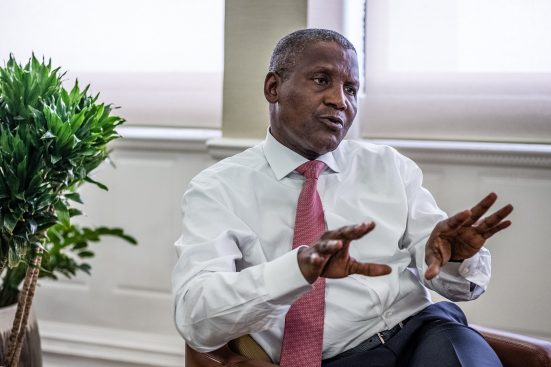In the wake of the COVID-19 pandemic that has stretched Nigeria’s underfunded medical sector thin, Aliko Dangote has called on the private sector to contribute 1 percent of their profits to fund the country’s health sector.
He stated that the fund which is distinct from corporate tax will be used to improve the country’s health sector to better serve communities where infrastructure and personnel are almost non-existent.
The businessman made the suggestion during a virtual Bloomberg New Economic Forum (NEF). Also, in attendance at the event was the Founder and Chief Executive of Flagship Pioneering and Co-founder and Chairman of Moderna, Dr. Noubar Afeyan, and Co-founder and Chief Strategist at Partners in Health Care, Chair of the Department of Global Health and Social Medicine at Harvard Medical School, USA, Dr. Paul Farmer.
READ ALSO: Naira Declines Further As Dollar Sells For ₦478
The session was themed, “CrossSector Mobilisation in Times of Crisis: Public Health Perspective,” Dangote while responding to a question on the challenge of funding to tackle the health crisis said: “It is more to do with funding. Like what we are doing in Nigeria as a foundation (Aliko Dangote Foundation), we are trying to sponsor a bill to our Congress where we want them to impose a tax. This is a separate tax, not a corporate tax, of maybe about one percent of all our profits, in the private sector, so that they will fund health.
“And I think it is the only way; we cannot just leave government alone. Government alone cannot fund health. So we the foundations, the private sector and then the government, we have to actually work together to make sure that we fund health. You know, it is a very, very important sector and without a healthy population, there is no way you have a healthy economy.”
Speaking on the ravaging impact of the COVID-19 pandemic on Nigeria’s health and economic sectors, Aliko Dangote opined that, “for us here in Nigeria, mostly in Africa, the COVID-19 is really an eye-opener because when you look at it, we have two impacts. One is the human impact, the other one is the economy.
“In Africa, most of it is actually the economic impact, because at the beginning, we shut down all our activities, we shut down the airports. So when you look at the economic impact for us, it is huge. But the human impact, we, as at today, have about 65,000 cases thereabout in Nigeria, and we have 1,165 deaths.”
“So it’s not really much compared to the population, which is, around 200 million. But because of the economic impact, a lot of people couldn’t really go out to make their livelihood. So what we did was we setup a Coalition against COVID-19 mobilized by Dangote Foundation and the private sector and together we raised the sum of $112 million. With the funding, we set up 39 isolation centres, of which the smallest one is 100 beds and the biggest ones are 200 beds. And they have ventilators which we bought; they have all the equipment.
“We also distributed palliatives for 10 million people, which is five percent of the population; thus people at the bottom of the pyramid. By so doing, we were able to reduce the effect of the lockdown on the economy.” he added.












